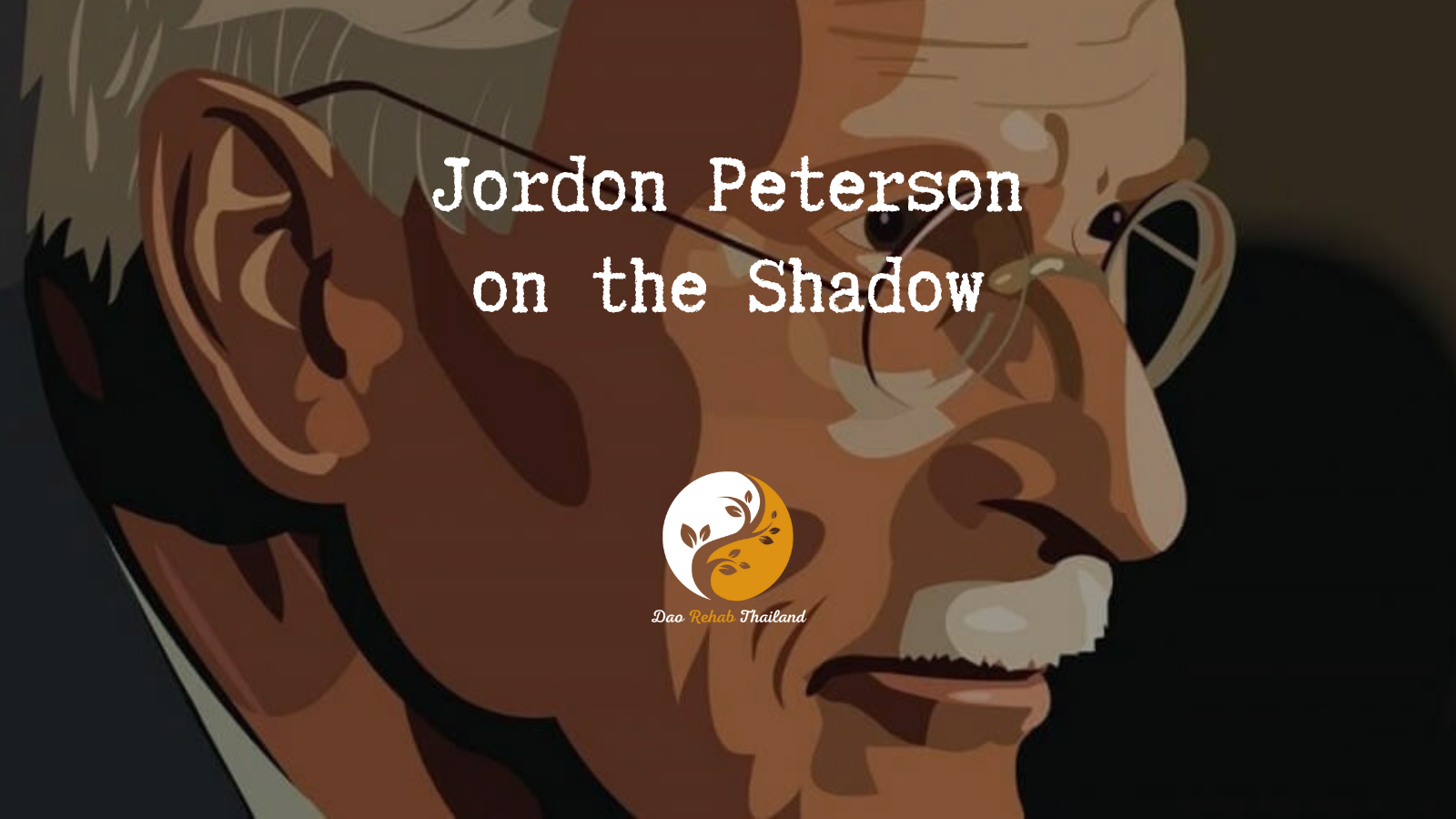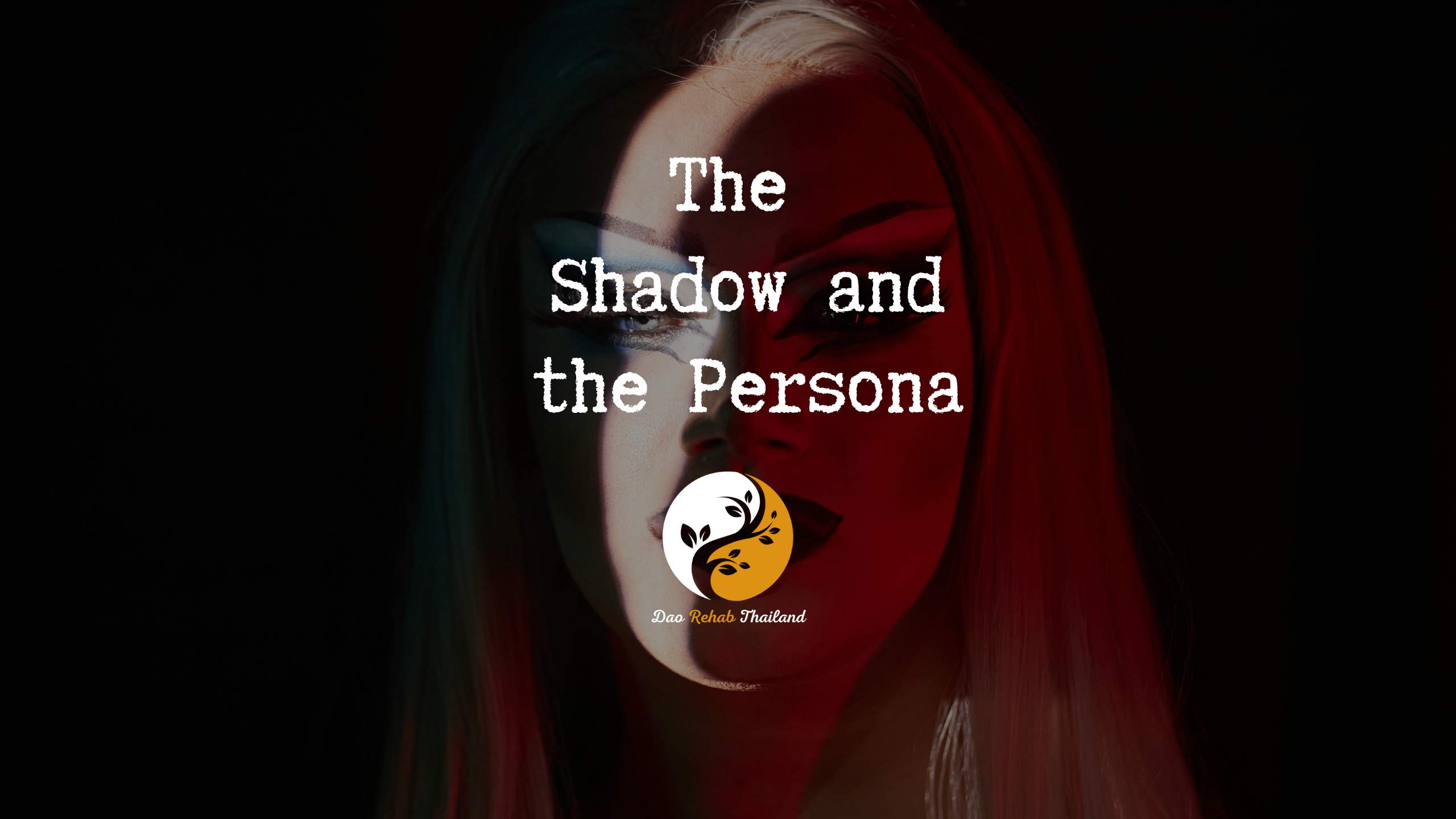
Jordon Peterson on the Shadow
Jordon Peterson on the Shadow
“Turning the impossible into possible”

"Detox from Drugs at a Luxury Holistic Center in Thailand and Israel"

Prof. Jordan Peterson on the Shadow - An Essay in the Spirit of Carl Jung
The shadow is an integral part of the human personality, containing the dark and less desirable aspects of the self. Carl Jung, a psychologist and philosopher, argued that in order to achieve wholeness as humans, the existence of the shadow must be acknowledged and integrated into consciousness. Although people often shy away from confronting their dark side, its suppression and denial can lead to devastating consequences.
"Holistic Center for Trauma, Addiction, and Mental Imbalance Treatment in Thailand"
“Come to the beginning of your journey to freedom from addiction to alcohol, drugs, and pills, and rediscover your life within the serene embrace of DaoTherapy Rehab in Thailand—where holistic healing meets empowering recovery.”
DaoTherapy Holistic Rehab
Key Elements of Drugs Detox:
Medical Supervision: Drugs detox must be conducted under medical supervision, as the body may experience withdrawal symptoms. These can include nausea, anxiety, muscle aches, and insomnia. A medical team will monitor and manage these symptoms to ensure the patient’s safety and comfort.
Holistic Therapies:
Holistic Therapies: Many detox programs incorporate holistic therapies such as mindfulness, yoga, and meditation to help individuals cope with stress and anxiety during the detox process. These therapies support the mind-body connection and contribute to overall recovery.
Tapering Process
Tapering Process: Drugs detox often involves a gradual tapering of the drug to reduce withdrawal severity. Doctors will slowly decrease the dosage over time to allow the body to adjust to lower levels of the substance.
Psychological Support:
Psychological Support: Like any addiction recovery process, detox from Drugs includes psychological support. This can involve counseling, therapy, or support groups to address the mental and emotional aspects of addiction.
Post-Detox Treatment:
Post-Detox Treatment: After completing detox, continuing treatment is crucial to prevent relapse. This often includes participation in ongoing therapy, group support, and the development of new coping strategies to maintain sobriety.
The shadow is an integral part of the human personality
The shadow is an integral part of the human personality, containing the dark and less desirable aspects of the self. Carl Jung, a psychologist and philosopher, argued that in order to achieve wholeness as humans, the existence of the shadow must be acknowledged and integrated into consciousness. Although people often shy away from confronting their dark side, its suppression and denial can lead to destructive consequences.
The shadow contains the impulses, passions, and traits that are considered unacceptable by society or rejected by the person themselves. It can include aggression, anger, jealousy, forbidden desires, and other traits that are inconsistent with the ideal self-image. When the shadow is suppressed, it remains primitive and undeveloped, and can emerge in unexpected and harmful ways.
However, the shadow is not only a source of negative traits. It also contains powerful energy, creativity, and potential for growth. By becoming aware of and integrating the shadow, these forces can be harnessed for good. It takes courage to face the challenging aspects of the self, but the process ultimately leads to wholeness and self-fulfillment.
One of the challenges in dealing with the shadow is the tendency to project it onto others. Instead of recognizing the existence of negative qualities within ourselves, we identify them in others and defend them for it. However, this projection prevents us from dealing with real problems and makes it difficult to have healthy interpersonal relationships.
To integrate the shadow, one must adopt an attitude of self-acceptance and compassion. Instead of judging or suppressing the less ideal aspects of the self, one must acknowledge their existence and explore them with curiosity. Through meditation, dreams, creativity, and other techniques, one can create a dialogue with the shadow and understand the messages and insights it brings.
Integrating the shadow does not mean letting wild impulses or aggression run wild. On the contrary, it is about creating awareness and conscious control over these aspects. By recognizing the destructive potential of the shadow, its energy can be channeled in positive and creative directions. For example, a person with aggressive tendencies can learn martial arts or engage in competitive sports, thereby channeling this energy in a constructive way.
Ultimately, dealing with the shadow is an essential part of the process of personal growth and development. It requires courage, honesty, and a willingness to face the challenging aspects of the self. But by integrating the shadow, one is freed from the need to fight it or avoid it. Instead, its powers can be used as a lever for positive change and true self-fulfillment. The process is not easy, but it ultimately leads to a fuller, more authentic, and more meaningful life.

contact us
Contact us with your questions
We would love to speak with you! Feel free to reach out with any questions.

get in touch
Schedule a free consultation
Schedule a free consultation with our team and let’s make things happen!
The Shadow - The Key to Growth and Self-Realization
What is the shadow?
The shadow is a central concept in Carl Jung’s analytical psychology, referring to the unconscious part of the personality, containing all aspects that do not correspond to a person’s conscious self-image. The shadow consists of traits, impulses, and emotions that have been rejected or repressed by the ego, often due to their incongruence with social expectations or the ideal of the self. Although often viewed as a negative or dark aspect of the self, the shadow is an integral and valuable part of psychological wholeness.
Why do people avoid the shadow?
Dealing with the shadow can be challenging and intimidating for many. People are often afraid to acknowledge the existence of less pleasant or acceptable aspects of themselves, for fear that doing so will undermine their sense of self-worth or lead to social rejection. In addition, confronting the shadow can trigger feelings of shame, guilt, or pain, which many people prefer to avoid. As a result, there is a tendency to suppress or deny the existence of the shadow, rather than confront it directly.
The Consequences of Shadow Suppression
Although shadow suppression may seem like an easy and convenient solution, it can lead to significant negative consequences. When certain aspects of the self are repressed or denied, they remain primitive and undeveloped. The shadow can take over a person’s behavior in unconscious and involuntary ways, such as outbursts of rage, compulsive behaviors, or destructive patterns in interpersonal relationships. In addition, suppressing the shadow requires a lot of mental energy, which can lead to exhaustion, depression, or a feeling of inner emptiness.
The Shadow as a Source of Growth and Creativity
Despite its challenging aspects, the shadow also contains enormous potential for personal growth and creativity. It is a reservoir of unfulfilled energy, passions, and abilities that can be channeled in positive and beneficial directions. For example, a person who suppresses their aggressive side may find ways to channel this energy into areas such as sports, leadership, or social advocacy. Similarly, a person who is struggling with feelings of jealousy or competitiveness can use them as a lever for personal development and goal achievement. By accepting and integrating the shadow, new forces are released that can enrich and empower life.
Dealing with Projection
One of the significant challenges in the process of integrating the shadow is the tendency to project it onto others. Instead of recognizing the existence of negative or undesirable qualities within ourselves, we tend to identify them in others and criticize or condemn them for it. For example, a person who has difficulty recognizing anger or jealousy in themselves may criticize others who exhibit similar feelings. Projection prevents us from facing our real challenges and makes it difficult to have healthy interpersonal relationships. In order to integrate the shadow, it is important to recognize this tendency and take responsibility for the different aspects of ourselves.
Cultivating Self-Acceptance and Compassion
The first step in the process of dealing with the shadow is to adopt an attitude of self-acceptance and compassion. Instead of judging or condemning the less ideal aspects of the self, one must learn to accept them with understanding and love. This requires recognizing that all human beings are complex beings, with strengths and weaknesses, and that the shadow is a natural and inseparable part of the personality. By cultivating compassion for ourselves, we create a safe inner space to explore the shadow without fear of criticism or punishment.
Creating a dialogue with the shadow
Once we have adopted an attitude of self-acceptance, we can begin to create a dialogue with the shadow. This can be done through meditation, writing, artistic creation, or other techniques that allow access to unconscious content. The goal is to listen to the voice of the shadow, explore the messages and insights it brings, and understand the basic needs it expresses. The shadow often contains important truths about ourselves, which, if ignored, can be detrimental to our personal development. By consciously connecting with the shadow, we can benefit from the wisdom it offers.
Regulating and Transmuting Shadow Energy
Integrating the shadow does not mean letting wild impulses or aggression run our lives. On the contrary, it is about creating awareness and intentional control over these aspects. When we recognize the destructive potential of the shadow, we can find ways to channel its energy in positive and creative directions. For example, a person with strong competitive tendencies can channel this motivation toward achieving personal or professional goals, while maintaining healthy and ethical relationships with others. Similarly, a person struggling with feelings of loneliness or rejection can use them as a lever to create meaningful connections and develop empathy for others.
The Shadow as a Journey of Self-Discovery
Ultimately, dealing with the shadow is an ongoing process of self-discovery and personal growth. It requires courage, honesty, and a willingness to look within, even when it causes discomfort or pain. But while the path may be challenging, the fruits of this work are profound and meaningful. By integrating the shadow, we become more whole and authentic, able to live our lives from a place of conscious choice and personal responsibility. We free ourselves from compulsive or destructive patterns, and learn to accept ourselves and others with compassion and understanding.
Towards a Fuller, More Meaningful Life
Integrating the shadow is a vital step on the path to a fuller, more fulfilling, and more meaningful life. When we befriend the darker aspects of ourselves, we expand our range of consciousness and choice. We become less controlled by fears, urges, or limiting beliefs, and more able to live in accordance with our values and aspirations. The process requires commitment, patience, and self-compassion, but the rewards are immense. In cultivating a conscious and loving relationship with all parts of ourselves, we discover an inner depth, strength, and beauty that was hidden within us all along.
In conclusion, the shadow is an integral and valuable part of the human psyche, containing the less recognized or accepted aspects of ourselves. Although confronting the shadow can be challenging, it is a vital step on the path to growth, wholeness, and self-fulfillment. By cultivating awareness, acceptance, and compassion for all parts of ourselves, we can unleash our inherent potential and live deeper and more fulfilling lives. It is a journey of discovery and development, inviting us to confront our deepest fears and embrace the full power and beauty of who we are. And in the end, we may discover that the shadow, once perceived as an enemy, is actually a friend and teacher, leading us toward a fuller, more authentic, and more meaningful life.
Key insights
1. In order to complete yourself as a human being, you must fulfill the monster within you.
2. You can’t say no to people, and you are dragged along by the crowd. Then if the crowd does something particularly pathological, you won’t be able to resist it.
3. To be good, I can be a monster, but I can be like a civilized monster.
4. You have to be incredibly dangerous. The more dangerous you are, the better. And then you have to control that.
5. If you can bite them, then you usually don’t have to.
6. If you suppress your shadow and isolate it from consciousness, it is never corrected.
7. You are immoral if you are simply harmless.
8. Every person carries a shadow, and the less it is embodied in the person’s conscious life, the blacker and denser it is.
9. If inferiority is conscious, you always have the opportunity to correct it.
10. If you imagine someone who is brave enough to pull all the strings, then you get a person who is aware of a pretty thick shadow.
practical advice:
1. Be aware of your dark side and don’t run from it. You have to acknowledge that it exists.
2. Take the energy from your dark side and do something creative with it or support a cause you believe in.
3. Pay attention to your frustration. If you are frustrated with something, it reveals two things: either you are an adult and need to stop complaining and move on, or people have really hurt you too much and taken cheap shots at you and put you down.
4. Ask yourself: What am I doing or not doing because I am a good person? Maybe it’s because you are good, but maybe it’s because of fear that’s holding you back, not your morals.
5. Imagine that you have a problem, and then imagine that you want a solution. But the real problem is that you have problems.
6. Face the fact that life is tragic and evil abounds. Don’t wave the little flag of happiness in front of it. No one believes that it will work.
Psychological Support:
Psychological Support: Like any addiction recovery process, detox from Subutex includes psychological support. This can involve counseling, therapy, or support groups to address the mental and emotional aspects of addiction.
Mantras for self-talk
1. I am incredibly dangerous, but I have control over it.
2. I am aware of my dark side and do not run from it.
3. I take the energy from my dark side and make something creative out of it.
1. Courage is not measured by the absence of fear, but by overcoming it.
2. Darkness cannot drive out darkness; only light can do that. Hatred cannot drive out hatred; only love can do that.
3. He who fights monsters must be careful not to become a monster himself. And when you stare long into the abyss, the abyss stares into you too.
Examine your mind:
1. Have you noticed any feelings of frustration or anger you’ve been feeling lately? What might they reveal about your dark side that you may have been repressing?
2. Can you think of one way you can start to incorporate your dark side into your life in a healthy and helpful way?
3. Is there a situation in your life right now where you need to be a little more “dangerous” or assertive, rather than just being obedient or polite?
4. What can help you accept the fact that life can be difficult and full of suffering, without losing hope or breaking down?
5. What is one way you can take the energy from your dark side this week and channel it into something creative or helpful?








